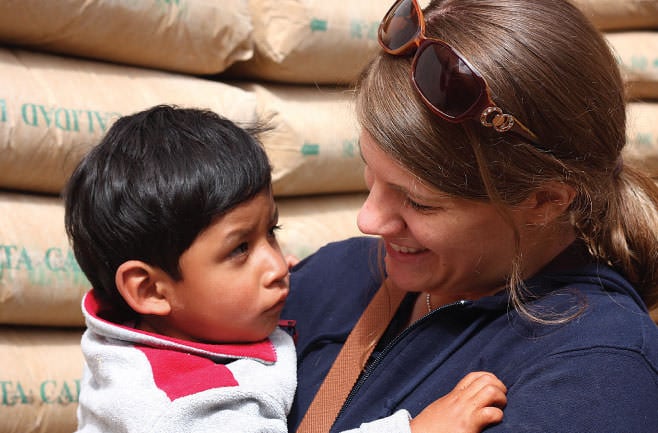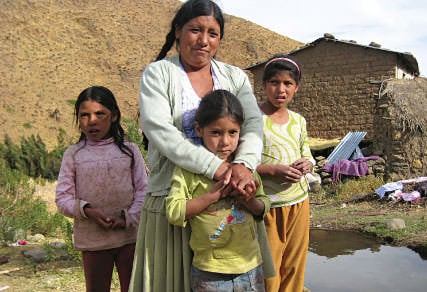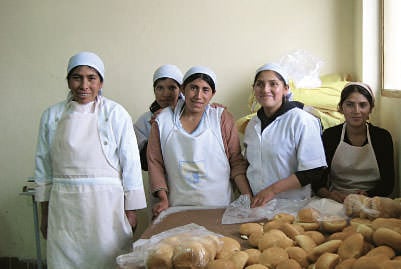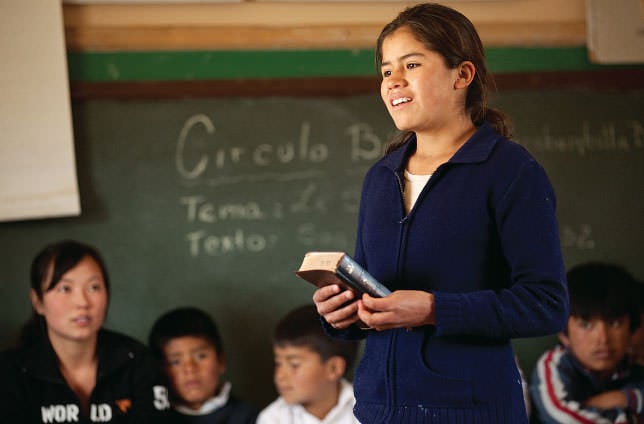Confessions of a Child Sponsorship Skeptic

Matthew Paul Turner for World Vision
When I was invited by World Vision to travel to Cochabamba, Bolivia, for a week to help raise awareness about child sponsorship through my blog, I confess I was a little skeptical. The phrase child sponsorship brought to mind a movie star in a TV commercial, kneeling beside a child and pleading, “If you can just save one life, won’t it be worth it?”
As passionate as I was about alleviating poverty, I worried that child sponsorship was too limited. I thought it meant that only a few select children received meals, school supplies, and medical attention. I worried that it created dependency, and that it forced families to attend church in order to receive assistance for their little ones.
I could certainly see the value in saving “just one life.” Yet I longed to invest in solutions for the underlying problems perpetuating poverty across entire communities, rather than invest in simply easing poverty among a few. These concerns didn’t stop me from sponsoring children, but they kept me from advocating on behalf of World Vision's sponsorship model. And I wasn’t alone.
Sponsor a child today »“So I went to Bolivia with both an open heart and an inquisitive mind, armed with a long list of questions…”
Many of my friends and readers were wary of the suggestion that our responsibility to the world is limited to caring for “just one child.” My generation, now in our 20s and 30s, has become increasingly interested in addressing the systemic causes of poverty rather than simply applying Band-Aids to open wounds. We long to “let justice roll on like a river” (Amos 5:24), not for charity to drip out like a leaky faucet.
So I went to Bolivia with both an open heart and an inquisitive mind, armed with a long list of questions I’d solicited from my readers about child sponsorship. I’m pleased to report that my experience dramatically changed my perspective on child sponsorship. World Vision far exceeded my expectations.
A Community-Based Approach
Outside the city of Cochabamba, where snow-covered mountains loom over arid, rocky hills, and where horses and cows perch as skillfully as mountain goats upon the steep slopes, I met a woman named Cinda. A quiet, sun-weathered woman with earnest eyes, she wore her long black hair in two braids down her back. Her youngest daughter, about 7, hid shyly behind her mother’s skirts as Cinda told us her story.

Cinda had three little girls and several acres of land to tend when her husband abandoned the family. Although she harnessed the skills necessary to harvest potatoes and beans, her planting time, yield, and variety were limited due to a lack of irrigation on her property. With only one adult tending the fields and caring for the children, it would be difficult for her family to survive.
Cinda wasn’t the only one with a water problem. She and her neighbors live beneath the snow-capped mountain called Hunu. To catch the runoff from melted snow, residents had built a dam, but it was inefficient: It provided water for only a few dozen families, stirring up strife between neighbors desperate for its life-saving waters.

But Cinda’s daughters found World Vision sponsors. And that changed everything.
Sponsorship contributions not only purchased school supplies and meals for Cinda’s daughters, but also — when pooled with contributions for other local sponsored children — helped solve problems that were keeping the community in poverty. Like their desperate need for water. Partnering with local municipalities, World Vision helped the community build and maintain a better dam. This beautiful reservoir of deep blue beneath Hunu provides irrigation to more than 170 families.
Now a stream runs swiftly through Cinda’s property, which yields several varieties of potatoes and beans and sustains a couple of llamas, a herd of sheep, and a very noisy pig. In fact, Cinda produces enough crops to both feed her family and sell the excess at market. In this way, sponsorship not only helps provide for her children’s immediate needs, but also improves their overall quality of life.
World Vision’s community-based approach to poverty became clear to me in Bolivia. It begins by identifying and addressing the needs of children, and then works to address the root causes of those needs in the community. Sponsorship donations are pooled to provide the child, his or her family, their community, and other impoverished children with the assistance they most need. I saw how sponsorship money has funded everything from guinea pig farms to after-school programs, hearing aids and irrigation systems to marriage counseling and maternal-health programs.
Sustainability & Empowerment
I’d supported World Vision for several years, but I never realized that when World Vision begins working in a community its goal is to remain there for 15-20 years. After that, it slowly transitions so that all the programs, systems, and opportunities are handed over to the community to sustain.
“Far from creating dependency, child sponsorship helps lift entire communities out of poverty in sustainable ways.”
For example, World Vision initiated the dam and irrigation system in Cinda’s community and provided training. Yet the structures were designed by locals, built by locals, and are so well-maintained by locals that they have become self-sustaining. One man — wrinkled and toothless and full of laughter — proudly informed me that when floods damaged part of the dam last year, he and his neighbors repaired it, without any assistance from World Vision.
We also visited a bakery in Cochabamba that employs the mothers of sponsored children. (Oh, it smelled heavenly.) Over the past few years the bakery has grown and now it thrives, providing rolls, cookies, and cereal to local families, as well as several public schools in the area. The bakery turns a profit, resulting in better wages for its workers. The goal is that it will become self-sustaining.

Far from creating dependency, child sponsorship helps lift entire communities out of poverty in sustainable ways. This creates a better future for sponsored children and for upcoming generations.
Local Staff
I like to think that I know best how to help my sponsored children. The truth is, when it comes to poverty, local problems are usually best solved by local people. Workers indigenous to the area are often better equipped to build relationships with families in need and to navigate the cultural nuances that make humanitarian work so challenging and so exciting.
On my trip, I was delighted to learn that more than 90 percent of World Vision’s international staff consists of people who are local to the communities they serve. In fact, every staff single member I met in Cochabamba was Bolivian. And they represent the best and the brightest. I met two doctors, an engineer, an agricultural specialist, and a food specialist, as well as several teachers, accountants, and administrators.
I saw that child sponsorship empowers local professionals, parents, grandparents, and neighbors to care for the children in their communities. This strategy ensures that no cultural barriers stand in the way of progress.
Contextual Spirituality
In Bolivia, more than 99 percent of the population identifies itself as Christian. So World Vision staff is free to partner with local churches of various denominations to host Bible schools and faith-related activities. But aid is never withheld from families who do not participate. World Vision staff members take care to not impose U.S.-style religious practices on the people they serve. This is why World Vision can work in countries where Christianity is illegal. When the goal is simply to love as Jesus loved, communities are transformed by this compassion and care.
In Cochabamba, I met with four brave couples who shared deeply personal stories. Each had experienced radical change during marriage counseling organized by World Vision with a local pastor. One young man, Adam, confessed that he had once been jealous and controlling of his wife; she had to get permission from him to even leave the house, and he felt only anger and bitterness toward her.
But after joining this group of young couples, Adam began to pray for a softer heart. As he shared his story, he put his hand on his wife’s shoulder. In turn, she shyly nestled her face against his chest, tears of joy streaming down her face. Now Adam supports his wife’s autonomy. He speaks about her with respect and affection because his heart has changed. Their newfound bond has created a safer, more nurturing environment for their two children.
World Vision staff members explained that in rural Bolivia, where drug addiction, alcoholism, and domestic violence run rampant, some problems cannot simply be solved with money, resources, and education. They are matters of the heart. Counseling, therefore, is a critical part of this child sponsorship project.

Living Proof
I met so many people in Bolivia who helped change my view of child sponsorship, including a girl named Lizeth, age 13 or 14. Early in the trip, our team had arrived at a school where the children waited outside to greet us. I was drawn instantly to Lizeth. She greeted me with a big smile and a confident laugh.
I asked her to teach me some Spanish words, pointing to my eye, nose, mouth, and ear. “Ojo!” she shouted. Then, “Nariz! Boca! Pie!”
Somewhere in there, she must have made a joke, because her friends started giggling.
As it turns out, Lizeth was indeed a leader. In fact, she volunteered to share the devotional that morning. She spoke quietly but confidently from Matthew 13, where Jesus teaches that the kingdom of heaven is like a mustard seed: “Though it is the smallest of all your seeds, yet when it grows, it is the largest of garden plants and becomes a tree, so that the birds of the air come and perch in its branches.”
It was the only time during the trip that I couldn’t stop myself from crying on the spot. The mustard seed is a beautiful picture of World Vision’s approach to helping communities lift themselves out of poverty. The organization starts by addressing the needs of children and then, from there, works to improve the conditions surrounding them so that mothers, fathers, grandparents, siblings, and the entire community are affected. A single sponsorship is like a tiny mustard seed that, when it grows, becomes a tree in which the birds come and perch in its branches.
Lizeth is living proof that this model works. Her testimony, and that of so many others, turned this skeptic into a lifelong advocate.
Your sponsorship donation changes lives.
As a child sponsor, your monthly sponsorship gift of $39 will provide one special child — and others in his or her community — with life-changing basics like clean water, nutritious food, healthcare, education, spiritual nurture and more.
Sponsor a child today »